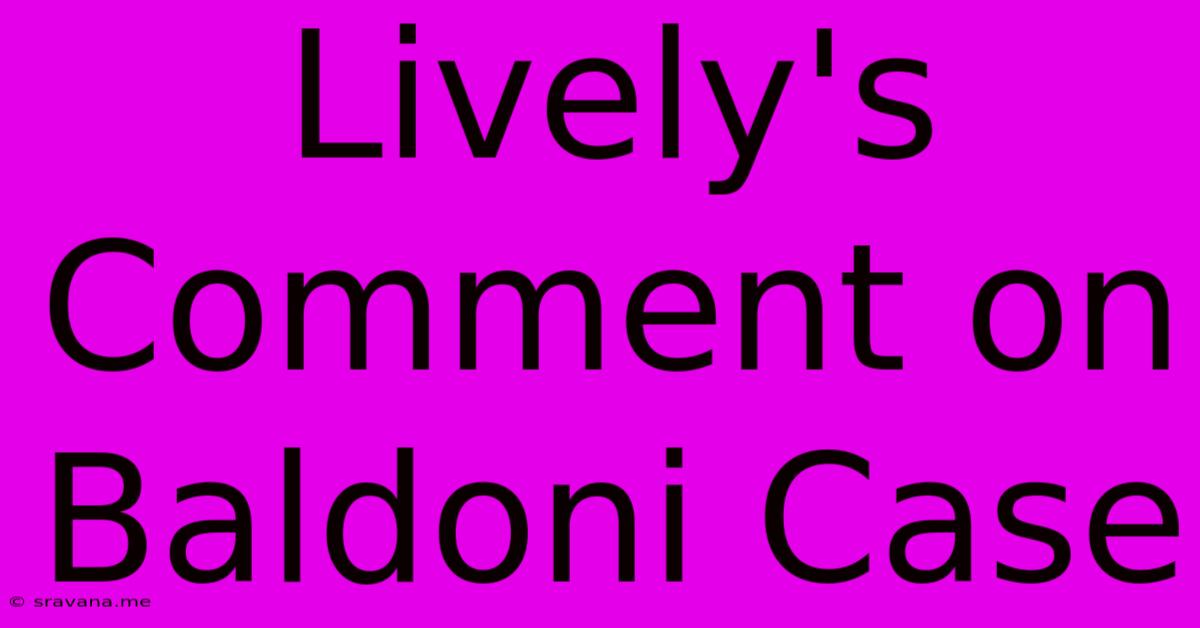Lively's Comment On Baldoni Case

Discover more detailed and exciting information on our website. Click the link below to start your adventure: Visit Best Website sravana.me. Don't miss out!
Table of Contents
Lively's Comment on the Baldoni Case: A Legal and Ethical Deep Dive
The recent comments made by [Lively's Name - Replace with the actual name] regarding the Baldoni case have ignited a firestorm of debate, sparking discussions across legal, ethical, and social media platforms. This article will delve into the specifics of Lively's statement, analyze its implications, and explore the broader context of the Baldoni case itself. We will also examine the potential legal ramifications and the ethical considerations raised by Lively's intervention.
Understanding the Baldoni Case
Before analyzing Lively's comments, it's crucial to understand the core of the Baldoni case. [Provide a concise, factual summary of the Baldoni case. Include details about the charges, the defendant, the key evidence, and the current status of the case. Avoid biased language and stick to verifiable facts. Examples: Was it a criminal or civil case? What were the alleged crimes or violations? What is the current stage of the proceedings?]. The case has attracted significant public attention due to [mention reasons for public interest, e.g., the high-profile nature of the individuals involved, the severity of the alleged crime, unique legal aspects].
Key Facts of the Baldoni Case:
- Defendant: [Defendant's Name]
- Charges: [List the specific charges]
- Key Evidence: [Summarize key evidence presented]
- Current Status: [Describe the current stage of the case – trial, appeal, etc.]
Lively's Statement: A Word-by-Word Analysis
[Lively's Name]'s statement, made on [Date and Platform - e.g., October 26th, 2024, on Twitter], read: “[Insert the exact quote of Lively's comment here]”. This seemingly brief comment has been interpreted in various ways. Some argue it constitutes [Interpretation 1, e.g., an endorsement of the defendant], while others believe it represents [Interpretation 2, e.g., a critique of the legal process].
Deconstructing the Ambiguity:
The ambiguity of Lively's statement stems from [Explain the reasons for ambiguity – e.g., use of vague language, lack of specific context, potential for multiple interpretations]. The phrase "[Specific phrase from Lively's comment]" is particularly open to interpretation because [Explain why that specific phrase is ambiguous]. This lack of clarity has fueled much of the subsequent debate.
Legal Ramifications of Lively's Comment
Lively's comment could have significant legal ramifications, depending on its precise meaning and the context in which it was made. For example, if interpreted as [Interpretation leading to legal implications, e.g., an attempt to influence the jury], it could potentially lead to [Consequences, e.g., contempt of court charges]. The potential for legal action also depends on [Factors affecting legal ramifications, e.g., the jurisdiction, the specific laws governing public commentary on ongoing trials].
Potential Legal Actions:
- Contempt of Court: If the comment is deemed to interfere with the judicial process.
- Defamation: If the comment falsely accuses individuals involved in the case.
- Obstruction of Justice: If the comment is intended to hinder the investigation or trial.
Ethical Considerations
Beyond the legal aspects, Lively's comment raises several ethical questions. Public figures have a responsibility to be mindful of their words, particularly when commenting on sensitive legal matters. The potential for [Lively's comment's potential impact, e.g., misinformation, prejudice, and emotional distress] underscores the importance of responsible communication.
Ethical Dilemmas:
- Impact on Public Perception: Lively's comment could shape public opinion before the case concludes, potentially affecting the fairness of the trial.
- Responsibility of Public Figures: Does Lively's status as a [Lively's Profession/Status] give her a greater responsibility to use her platform judiciously?
- Freedom of Speech vs. Responsible Communication: Balancing the right to free speech with the need to avoid causing harm or undermining the legal process.
The Role of Social Media
The incident highlights the complexities of social media in the context of legal proceedings. Social media platforms offer a powerful megaphone for disseminating information, but they also lack the checks and balances of traditional media. This lack of editorial oversight can contribute to the spread of misinformation and speculation, potentially impacting the fairness and integrity of the judicial process.
The Impact of Social Media:
- Spread of Misinformation: Social media can amplify inaccurate or biased information, influencing public perception.
- Lack of Fact-Checking: The rapid spread of information on social media often outpaces fact-checking efforts.
- Amplification of Bias: Social media algorithms can reinforce existing biases, leading to echo chambers and polarization.
Conclusion
Lively's comment on the Baldoni case is more than just a fleeting social media post; it’s a case study in the intersection of law, ethics, and social media. The ambiguity of the comment, its potential legal repercussions, and the broader ethical considerations it raises underscore the need for caution and responsibility in public discourse surrounding ongoing legal proceedings. The incident serves as a stark reminder of the power of words and the responsibility that comes with wielding that power, particularly in the digital age. Further investigation and analysis are needed to fully understand the long-term consequences of Lively's statement and its impact on the Baldoni case and the public’s perception of justice. The ongoing debate highlights the urgent need for media literacy and responsible social media engagement in our increasingly interconnected world.

Thank you for visiting our website wich cover about Lively's Comment On Baldoni Case. We hope the information provided has been useful to you. Feel free to contact us if you have any questions or need further assistance. See you next time and dont miss to bookmark.
Also read the following articles
| Article Title | Date |
|---|---|
| Blue Origin New Era In Space Travel | Jan 21, 2025 |
| Livelys Comment On Baldoni Case | Jan 21, 2025 |
| One Of Them Days A Music Video Review | Jan 21, 2025 |
| Justin Baldonis 400 Million Lawsuit | Jan 21, 2025 |
| Xo Kitty Season 2 O Tooles Insights | Jan 21, 2025 |
